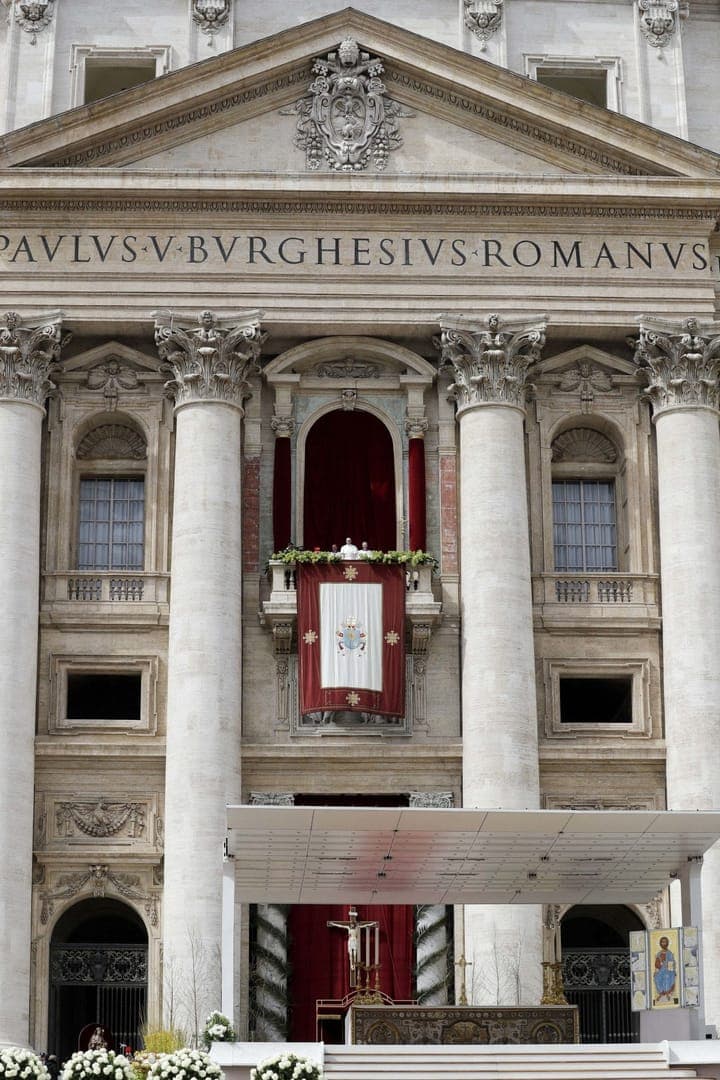ROME – On Christmas day Pope Francis said the message the infant Jesus brings is one of fraternity and welcome, and he prayed that a sense of brotherhood would overcome violent political and military conflicts raging throughout the world, from Ukraine to Africa and from Nicaragua to Syria.
The pope also called out what he said are the various forms of ideological, cultural and economic “colonization” infiltrating global society, which he said limit humanity’s freedom and compromise one’s identity.
“What is the universal message of Christmas? It is that God is a good Father and we are all brothers and sisters,” the pope said in his Christmas day Urbi et Orbi (“to the city and the world”) blessing. The prayer, given only twice a year on Christmas and Easter, in December traditionally serves as a quasi-papal foreign policy statement for the year to come.
In Tuesday’s prayer, Francis said that without the fraternity offered by the Christ Child born in Bethlehem, “our efforts for a more just world fall short, and even our best plans and projects risk being soulless and empty.”
“For this reason, my wish for a happy Christmas is a wish for fraternity. Fraternity among individuals of every nation and culture. Fraternity among people with different ideas, yet capable of respecting and listening to one another. Fraternity among persons of different religions,” he said, adding that “Jesus came to reveal the face of God to all those who seek him.”
Speaking of the “unbreakable bond” between family members, the pope said this same bond is true for the human family as a whole and prayed that the world would rediscover the fraternal ties “linking us together as individuals and joining all peoples.”
He prayed specifically for a resumption of dialogue between Israel and Palestine, whose decades-long conflict “has rent the land chosen by the Lord” for his incarnation. He also prayed for the “beloved and beleaguered” nation of Syria, asking that after years of war and division, the country would rediscover a sense of fraternal solidarity that puts the person first rather than partisan interests.
Mention was also made of the thousands of people fleeing their homelands due to violence and conflict, with the pope voicing hope that refugees and those who have been internally displaced would be able to return to their own countries and live in peace.
Francis also prayed that a truce would be brokered in Yemen, where thousands, including children, are dying of war and famine, and he prayed for the entire continent of Africa, whose millions of refugees and displaced persons are in desperate need of humanitarian aid. “May the Holy Child, the King of Peace, silence the clash of arms and allow a new dawn of fraternity to rise over the entire continent, blessing the efforts of all those who work to promote paths of reconciliation in political and social life,” he said.
Turning to the long-standing division on the Korean peninsula, Francis asked that the two parties pursue a path of fraternal rapprochement respecting the solutions that have already been agreed on.
He also prayed for the nations of Venezuela, Ukraine and Nicaragua, asking that priority would be given to the most vulnerable and that a desire for reconciliation would prevail over division.
On Ukraine, Francis stressed that the nation, whose conflict with Russia has produced a humanitarian crisis and has caused the highest number of displaced persons in Europe since World War II, will only be able to restore dignified living conditions for its citizens with “a peace respectful of the rights of every nation.”
“I am close to the Christian communities of the region, and I pray that they may develop relationships of fraternity and friendship,” he said.
Francis closed his message praying for those suffering from hunger and a lack of healthcare and education, and offered a message of support for Christians living in areas where they are persecuted or are a minority.
“May the Lord grant that they, and all minorities, may live in peace and see their rights recognized, especially the right to religious freedom,” he said, and asked that the child Jesus would watch over all who are vulnerable and discarded.
The day after Christmas, the feast of Saint Stephen, the Church’s first martyr, Francis will continue his Christmas events by leading pilgrims in the traditional Angelus prayer in St. Peter’s Square.
On New Year’s Eve he’ll pray Vespers in St. Peter’s basilica and will pop out to visit the nativity scene in St. Peter’s Square, this year made entirely out of sand. On Jan. 1, he will celebrate Mass for the solemnity of Mary, Mother of God, and his next major liturgical event will be the Jan. 6 Mass for the Epiphany.
Francis will close out the holidays with a speech to the diplomatic corps Jan. 7, and a Jan. 13 Mass for the Baptism of the Lord on Jan. 13, which he will celebrate in the Sistine chapel and during which he will baptize several infants.












